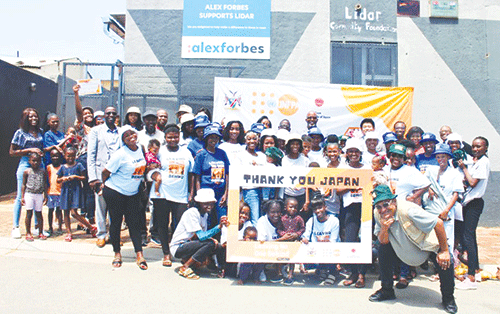The ‘Leaving No One Behind’ project seeks to promote the sexual and reproductive health and rights (SRHR) of young mothers through livelihood skills training and information-sharing on gender-based violence (GBV) and SRHR.
As part of the livelihood initiatives under the government of Japan-supported project, in conjunction with the UNFPA, the training and graduation were recently held in collaboration with Regain Trust and the Lidar Community Foundation in the capital.
“The skills gained during training will contribute to these young people’s resilience to deal with and overcome setbacks that life throws at them by diversifying their livelihood systems,” said Japanese ambassador to Namibia, Hisao Nishimaki.
He stated that graduation was a milestone moment for the young mothers (who are all under the age of 25), as they are now able to establish their income-generating businesses with the various skills they have gained in numerous areas, including cooking, baking, housekeeping, entrepreneurship as well as information on GBV and SRHR.
This is not the first time that the Japanese government is aiding Namibia in the health sector. Earlier this year, through the same project, Japan assisted in donating kitchen items, furniture, food packs and dignity kits to the Kazetjindire Angelika Muharukua Maternity Waiting Home in Opuwo.
“Our aim is clear: that we would like to secure pregnant women by delivering basic items and nutritional food so that we can strengthen the dignity and confidence of pregnant women in Namibia,” said Nishimaki then.
The UNFPA observed that approximately 32% of adolescent girls aged 15–19, and 35% of young women aged 20-24 have encountered physical violence from a partner in the country. The pervasive impact of gender-based violence on Namibia extends to economic and developmental setbacks, including absenteeism, loss of workdays due to illnesses, and hospitalisations, with insufficient economic and livelihood opportunities, making women more susceptible to harmful practices such as human trafficking and commercial sexual exploitation.
“There’s no problem that would not be solved if you have your hands as a woman, and if you have your mind and energy, we can do better things in life. Thanks for changing our lives for the better. We now know we can wake up and empower other young ladies,” said Zelda Swartbooi, a mother of three who participated in the three-week training.
Her heartfelt words underscore the tangible impact that investing in the lives of young mothers can have a meaningful impact. The training not only equipped young mothers with practical skills, but also instilled self-confidence, sisterhood and a sense of independence in these women. The ripple-effect of an empowered mother can go beyond individual lives, contributing to the broader goal of creating a more resilient and empowered community in Namibia.
The ‘Leaving No One Behind’ project is fully-funded by the Japanese government, aimed at addressing gender-based violence and negative sexual and reproductive health outcomes in Namibia.
It is dedicated to reaching those at risk of being left far behind, including vulnerable groups such as in- and out-of-school youth, pregnant and lactating women, women and girls facing multiple vulnerabilities, especially those with disabilities, refugees, and other groups at risk of sexual and gender-based violence. The project interventions include livelihood support, life skills and mental health and psychosocial support, essential lifesaving SRH, and GBV response and prevention services.
“This programme stands as a testament to the generous support of the government of Japan and its people through UNFPA. We express our sincere gratitude to the government and people of Japan for your commitment to advancing the well-being and empowerment of the people in Namibia,” said UNFPA HIV/Family Planning Programme Specialist, Grace Hidinua.
The UNFPA is the United Nations agency committed to sexual and reproductive health. Collaborating with governments and partners, it strives to eliminate unmet needs for family planning, preventable maternal deaths, gender-based violence and harmful practices such as child marriage and female genital mutilation. Additionally, it prioritises the regional goal of ending sexual transmission of HIV by the year 2030.


